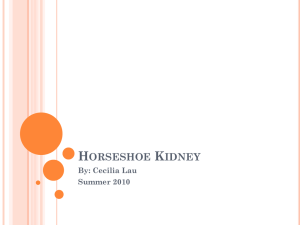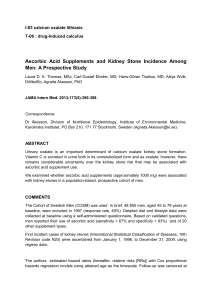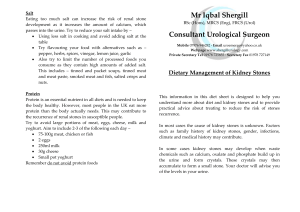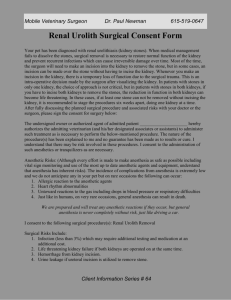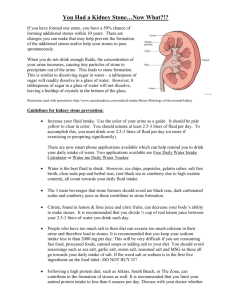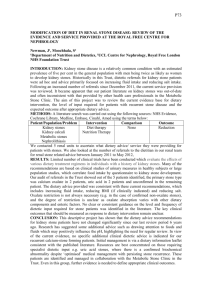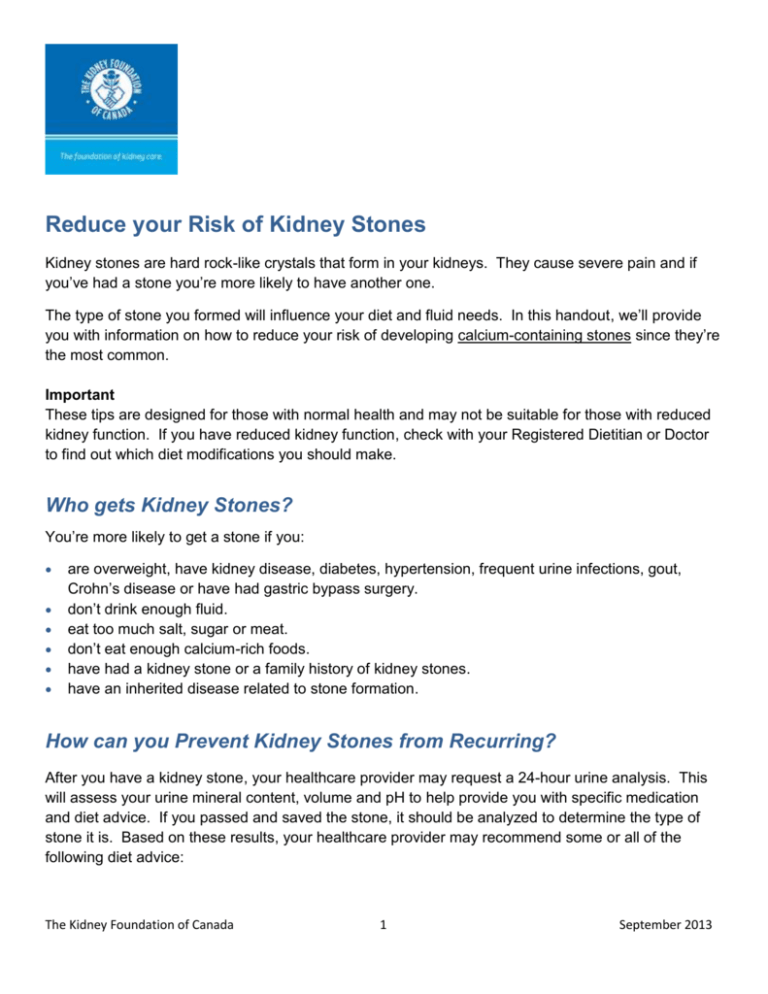
Reduce your Risk of Kidney Stones
Kidney stones are hard rock-like crystals that form in your kidneys. They cause severe pain and if
you’ve had a stone you’re more likely to have another one.
The type of stone you formed will influence your diet and fluid needs. In this handout, we’ll provide
you with information on how to reduce your risk of developing calcium-containing stones since they’re
the most common.
Important
These tips are designed for those with normal health and may not be suitable for those with reduced
kidney function. If you have reduced kidney function, check with your Registered Dietitian or Doctor
to find out which diet modifications you should make.
Who gets Kidney Stones?
You’re more likely to get a stone if you:
are overweight, have kidney disease, diabetes, hypertension, frequent urine infections, gout,
Crohn’s disease or have had gastric bypass surgery.
don’t drink enough fluid.
eat too much salt, sugar or meat.
don’t eat enough calcium-rich foods.
have had a kidney stone or a family history of kidney stones.
have an inherited disease related to stone formation.
How can you Prevent Kidney Stones from Recurring?
After you have a kidney stone, your healthcare provider may request a 24-hour urine analysis. This
will assess your urine mineral content, volume and pH to help provide you with specific medication
and diet advice. If you passed and saved the stone, it should be analyzed to determine the type of
stone it is. Based on these results, your healthcare provider may recommend some or all of the
following diet advice:
The Kidney Foundation of Canada
1
September 2013
Diet Advice to Prevent Kidney Stones
1. Most Important: Drink Plenty of Fluids, Especially Water!
Drinking adequate fluids will dilute the minerals in your urine. Concentrated urine causes minerals
to stick together and form stones.
Drink 2.5 - 3 liters of fluid each day. Spread out your fluid intake throughout the day. Your urine
should be clear or light yellow.
At least ½ of your fluid should be water. Milk, 100% fruit juice, tea and coffee also count as fluid.
Low sugar, low calorie fluids, like water and low fat milk are best.
Fluids rich in citrate (see our Fresh Lemonade recipe on www.kidneycommunitykitchen.ca) may
naturally help prevent kidney stones from forming.
2. Maintain a Healthy Weight
If you are overweight, you are at increased risk of stone formation.
Aim for a gradual weight loss through healthy food choices and exercise.
Avoid high protein weight loss diets and avoid laxatives to lose weight. High protein diets and
laxatives may increase your risk of stone formation.
3. Eat Less Salt
When you eat foods high in salt, you increase calcium levels in your urine, which puts you at
greater risk for kidney stones.
Aim for less than 2000mg of sodium per day. To find out how, see our Sodium (salt) and Chronic
Kidney Disease fact sheet. (http://www.kidney.ca/factsheets).
4. Consider Calcium and Oxalate
A common misconception is that cutting down on calcium intake will reduce the likelihood of
forming calcium-containing stones. But a diet low in calcium actually increases your risk of
developing kidney stones.
Until recently, it was often recommended to reduce dietary oxalate. Foods rich in oxalate include
peanuts, spinach, rhubarb, beets, chocolate and sweet potatoes. In theory, a diet low in oxalate
may reduce calcium oxalate stones. This approach, however, may result in an unhealthy diet and
isn’t supported by evidence. Instead, eat and drink calcium-rich foods with oxalate-containing
foods.
Calcium-rich foods (e.g. low fat dairy) help bind oxalate in the foods you eat and prevent its
absorption.
Eat a serving of calcium-rich food with each meal. A serving is 1 cup milk, ¾ cup yogurt, 1 oz of
cheese or 75g canned salmon (with bones).
The Kidney Foundation of Canada
2
September 2013
Other Diet Advice
A diet high in vegetables and fruit may lower your risk of stones. Eat 5 or more servings of
vegetables and fruit each day for optimal health. A serving is ½ cup cooked vegetables, 1 cup
leafy greens or 1 medium piece of fruit.
The DASH (Dietary Approach to Stop Hypertension) diet (www.kidney.ca/file/DASH.pdf) is rich in
vegetables, fruits and low fat dairy. It has been associated with a lower risk of kidney stones.
A diet high in meat (e.g. pork, beef, chicken, and fish) and organ meats may increase your risk of
stones, especially uric acid stones. Limit your meat consumption to 2-3 servings per day. A
serving is a ½ cup or 2.5 oz or 75 grams of cooked meat.
High sugar intake may increase your risk of stone formation. A good way to reduce your sugar is
to avoid sugar sweetened beverages such as soft-drinks, fruit cocktails, sports drinks, candy and
sweets.
Important
These tips are designed for those with normal health and may not be suitable for those with reduced
kidney function. If you have reduced kidney function, check with your Registered Dietitian or Doctor
to find out which diet modifications you should make. Our Kidney Community Kitchen website
(www.kidneycommunitykitchen.ca) also offers further information including recipes and meals plans.
For information and tools to help you manage your kidney-friendly diet, visit
www.kidneycommunitykitchen.ca
All rights reserved. This material does not constitute medical advice and is intended for informational purposes only. No one associated
with The Kidney Foundation of Canada will answer medical questions via e-mail. Please consult a healthcare professional for specific
treatment recommendations.
The Kidney Foundation of Canada
3
September 2013





